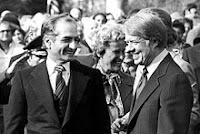 | ||
| The Shah of Iran with Jimmy Carter |
Let's move to Afghanistan where between 1979 and 1989 the Afghan people fought a war with the powerful Soviet Union. All was lost until the U.S. stepped in and provided the Afghan's rocket launchers and other weapons to combat the Soviet's. Within a few years the tide of the war had turned and the Soviets high tailed it back home with their tails between their legs. It appeared that the U.S. had a strategic ally in the Middle East. Not! With the war over, the Afghan's asked us for help to rebuild their country. President George H. Bush and his administration turned their backs and snubbed the Afghan's. Afghanistan was no longer an ally of America. This was followed by the 1990s Afghan Civil War, the rise and fall of the Taliban government and the present war we are involved in today. The decades of war made Afghanistan the world's most dangerous country, including the largest producer of refugees and asylum seekers. While the international community is rebuilding war-torn Afghanistan, terrorist groups such as the Haqqani Network and Hezbi Islam are actively involved in a nationwide Taliban-led insurgency, which includes hundreds of assassinations and suicide attacks. According to the United Nations, the insurgents were responsible for 80% of civilian casualties in 2011 and 2012.
Tomorrow, we will look at the U.S. involvement with the destabilization of Iraq and Egypt.

Comments
Post a Comment